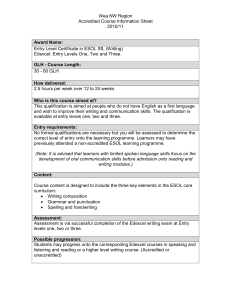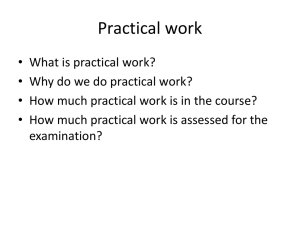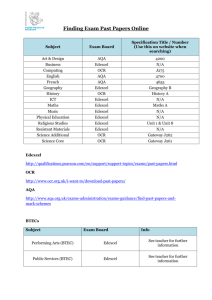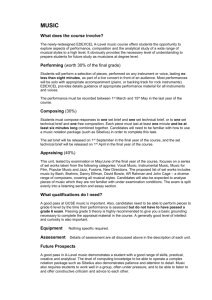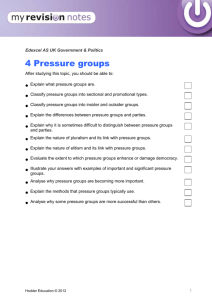AS/A Level GCE Physics Edexcel (8PH01, 9PH02) Entry Criteria
advertisement
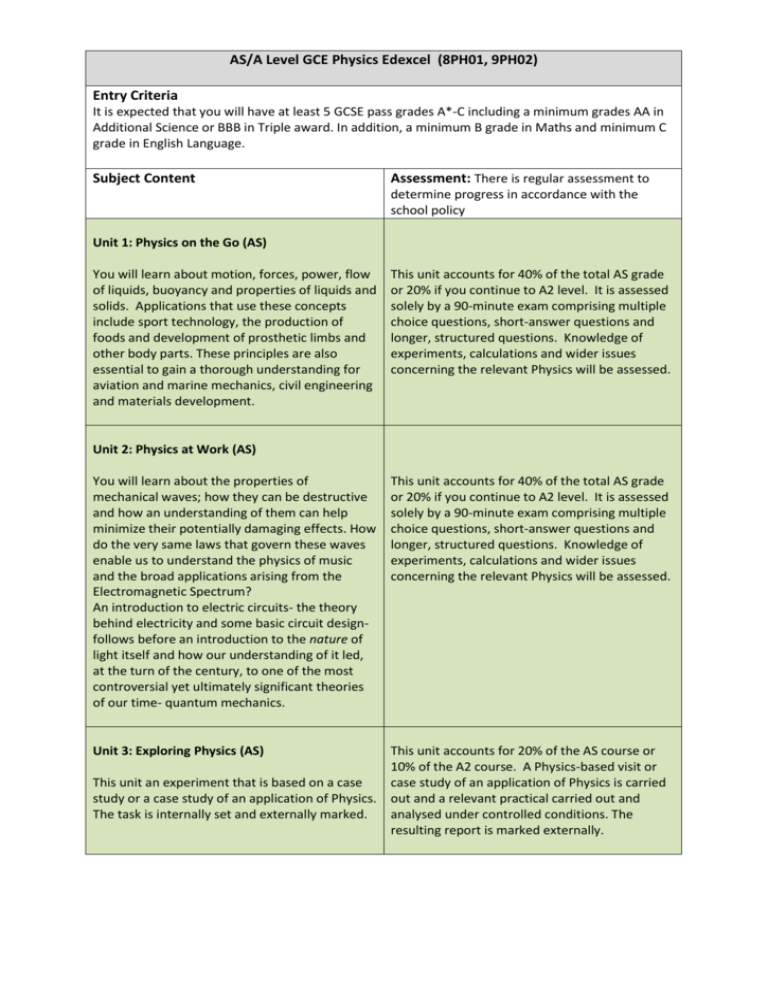
AS/A Level GCE Physics Edexcel (8PH01, 9PH02) Entry Criteria It is expected that you will have at least 5 GCSE pass grades A*-C including a minimum grades AA in Additional Science or BBB in Triple award. In addition, a minimum B grade in Maths and minimum C grade in English Language. Subject Content Assessment: There is regular assessment to determine progress in accordance with the school policy Unit 1: Physics on the Go (AS) You will learn about motion, forces, power, flow of liquids, buoyancy and properties of liquids and solids. Applications that use these concepts include sport technology, the production of foods and development of prosthetic limbs and other body parts. These principles are also essential to gain a thorough understanding for aviation and marine mechanics, civil engineering and materials development. This unit accounts for 40% of the total AS grade or 20% if you continue to A2 level. It is assessed solely by a 90-minute exam comprising multiple choice questions, short-answer questions and longer, structured questions. Knowledge of experiments, calculations and wider issues concerning the relevant Physics will be assessed. Unit 2: Physics at Work (AS) You will learn about the properties of mechanical waves; how they can be destructive and how an understanding of them can help minimize their potentially damaging effects. How do the very same laws that govern these waves enable us to understand the physics of music and the broad applications arising from the Electromagnetic Spectrum? An introduction to electric circuits- the theory behind electricity and some basic circuit designfollows before an introduction to the nature of light itself and how our understanding of it led, at the turn of the century, to one of the most controversial yet ultimately significant theories of our time- quantum mechanics. Unit 3: Exploring Physics (AS) This unit accounts for 40% of the total AS grade or 20% if you continue to A2 level. It is assessed solely by a 90-minute exam comprising multiple choice questions, short-answer questions and longer, structured questions. Knowledge of experiments, calculations and wider issues concerning the relevant Physics will be assessed. This unit accounts for 20% of the AS course or 10% of the A2 course. A Physics-based visit or This unit an experiment that is based on a case case study of an application of Physics is carried study or a case study of an application of Physics. out and a relevant practical carried out and The task is internally set and externally marked. analysed under controlled conditions. The resulting report is marked externally. Unit 4: Physics on the Move (A2) You will learn about momentum and circular motion as well as basic field theories (electric and magnetic). These ideas will then be brought together to examine fundamental particle detectors and accelerators before finally exploring the cutting edge work involved with particle theory including the current research being carried out at the LHC at CERN. This unit accounts for 20% of your A2 course. This unit is assessed by means of a written examination paper of 1 hour 35 minutes duration. The paper will consist of multiple choice questions, short questions and longer questions. Students may be required to apply their knowledge and understanding of physics to situations that they have not seen before. Unit 5: Physics from Creation to Collapse (A2) You will learn about the basic gas and thermodynamics laws which helped shape the industrial world. You will then look in greater detail at the forces keeping atoms and nuclei together, and the effects of their splitting. Finally, you will cover the force of gravity, our understanding of stellar evolution, modern astronomy observation techniques, and how they have helped us theorise the history and fate of the universe. This unit accounts for 20% of your A2 course. This unit is assessed by means of a written examination paper of 1 hour 35 minutes duration. The paper will consist of multiple choice questions, short questions and long questions. Students may be required to apply their knowledge and understanding of physics to situations that they have not seen before. Unit 6: Experimental Physics (A2) This unit involves planning an experiment, carrying out an experiment and analysing experimental results. The task is externally set and marked. This unit accounts for 10% of the A2 course. An experiment is planned, carried out and analysed under controlled conditions and marked externally Expectations Throughout the course, students are expected to undertake a minimum of 5 hours homework every week. Students are also expected to work independently from a number of texts. In addition to homework, formal assessments are carried out and graded in accordance with school policy. Practical investigations are carried out and graded in accordance with the Edexcel grading criteria. Recommended Reference Books Advanced Physics for You by Keith Johnson Other recommended texts for independent study General text books (recommended) A Level Physics by Roger Muncaster Advanced Physics Fifth Edition by Tom Duncan Advanced Physics Second Edition (Advanced Sciences) by Steve Adams and Jonathan Allday Collins Advanced Science - Physics by Ken Dobson, David Grace and David Lovett Calculations for A Level Physics Fourth Edition by T L Lowe and J F Rounce Edexcel Specific Edexcel AS Physics Student Book (Edexcel A Level Sciences) by Miles Hudson Edexcel Physics for AS (Advanced Physics for Edexcel Series) by Mike Benn and Graham George Edexcel AS Physics Revision Guide (EDEXCEL A LEVEL SCIENCES) by Mr Tim Tuggey, Richard Laird, Pauline Anning and Mr Keith Bridgeman AS-Level Physics Edexcel Complete Revision & Practice by CGP Books Edexcel Physics for A2 (Advanced Physics for Edexcel Series) by Tim Akrill and Graham George Edexcel A Level Science: A2 Physics Students' Book with Active Book CD (Edexcel A Level Sciences) by Miles Hudson Edexcel A2 Physics Revision Guide (EDEXCEL A LEVEL SCIENCES) by Mr Ken Clays, Charlie Milward and Mr Keith Bridgeman A2-Level Physics Edexcel Complete Revision & Practice by CGP Books Useful websites There are a number of useful study and revision websites which are frequently updated and increased. A list of some useful and interesting sites follows: Physics study/revision: www.examstutor.com www.cyberphysics.co.uk www.s-cool.co.uk www.tap.iop.org www.phet.colorado.edu www.science.howstuffworks.com/physical-science-channel.htm veritasium youtube channel Physics News: www.physlink.com/index.cfm www.physicsworld.com Careers Information Physics can be difficult but it can also be a very rewarding subject. It is suitable for students who: have an interest in Physics and how the world around us works enjoy applying their minds to problem solving enjoy imaginative and logical thinking and application to practical situations Physics is demanding but considered good training for a variety of future careers. Listed below are some careers for which Physics would be considered essential or useful: Research and development Design and Production Civil, Mechanical, Aeronautical, Marine or Electrical Engineering Geophysics or Meteorology Computing (hardware and software) Administration and Management Teaching Aviation Accountancy, Banking, Financial Analysis, Actuarial Science Medical Physics Astronomy Science Journalism
